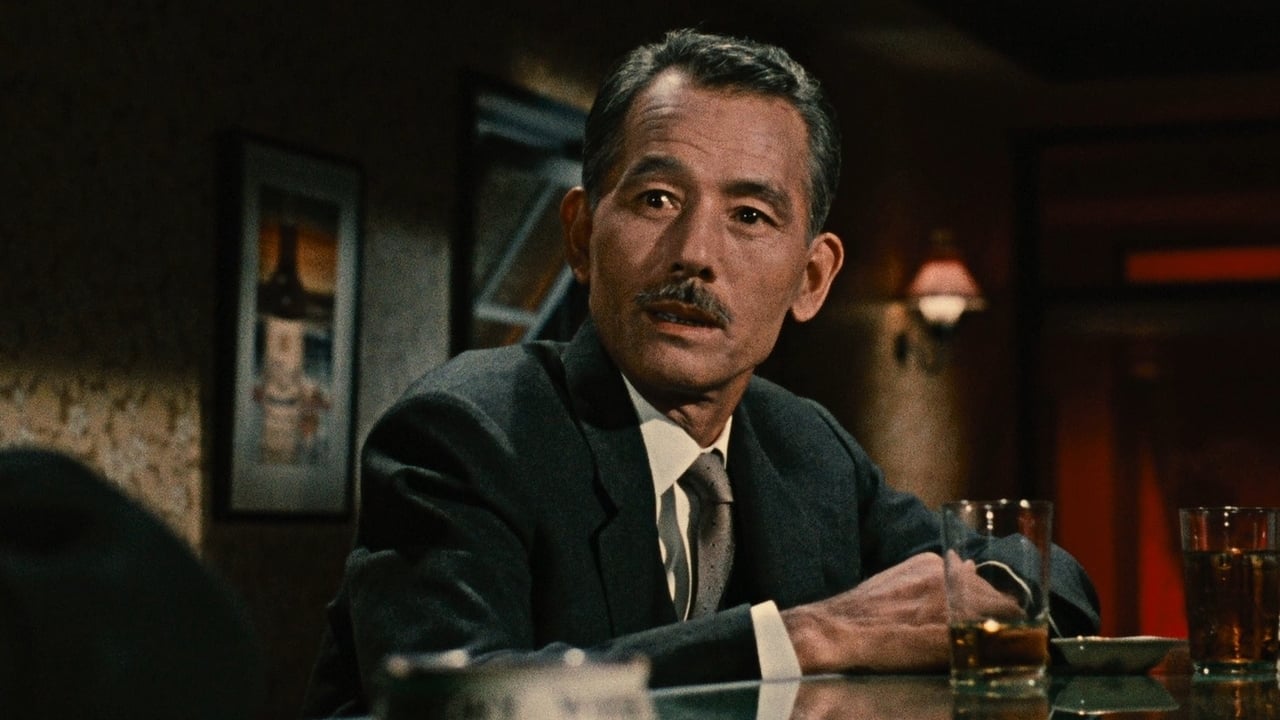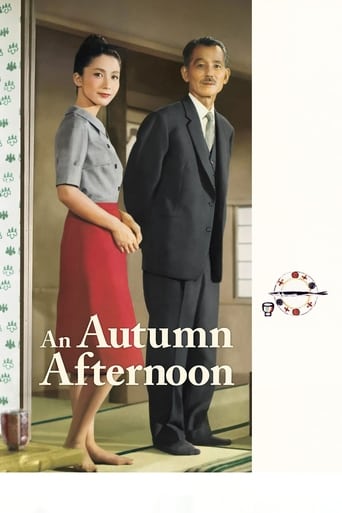

AN AUTUMN AFTERNOON is a drama which examines family relationships and life decisions in a warm way.The main protagonist is an ageing widower with a 32-year-old married son, and two unmarried children, 24-year-old daughter, and 21-year-old son. His wife has died just before the end of the war. His older son lives modestly with his wife in a small apartment. The widower and five of his classmates from middle-school hold regular reunions at a restaurant. They remember their old times and having fun with good food and drink. One of his friends has found a good opportunity for his daughter. She takes care of the housework, drunken father and younger brother. After a few events, the old man recognizes his own selfishness in keeping his daughter at home to look after him, and decides to arrange a marriage for her...Mr. Ozu has made another family drama that touches the soul. He examines topics related to a family, loneliness, alcoholism, marriage, through relationships between parents and children. His emotional space is narrowed to everyday life, in which a thin line separates the joy and the sorrow. He points to the transience of life through a family melodrama.The scenery is almost closed and spatially confined, that suggesting a monotonous daily routine. The characterization is excellent.Chishū Ryū as Shūhei Hirayama is a reserved and quiet old man who finds moments of his happiness in having fun, alcohol and beautiful owner of a bar. He skillfully hiding his inner emotion. He has tried to resist the transience of life, of course, to no avail. Shima Iwashita as Michiko Hirayama is his devoted daughter. She is aware of her situation, but unhappy at leaving his father and brother. Keiji Sada (Kōichi Hirayama) and Mariko Okada (Akiko Hirayama) are very entertaining as a quarrelsome couple, which is burdened with a material world. Anyway, life goes on.
... View MoreAn aging widower arranges a marriage for his only daughter.This was the final film of Ozu, who had been making great cinema for decades. His 1930s silent crime dramas are excellent, and everything after is worth a watch. For his final film, it gets a bit more modern. We have a young woman who really is not all that interested in getting married. How can it be that finding a suitable husband is not the first thing on hr mind? The framing and colors are excellent, and very much evoke the best of the 1960s. How Japan was different from other places at the time I do not know, but in some ways the worlds do not seem far apart. This could take place at an American office in the 50s or 60s. Well, without the bowing, anyway.
... View MoreThis Japanese film featured in the book 1001 Movies You Must See Before You Die,I didn't know anything about it other than that fact, and seeing that many films in the book have turned out great choices I was looking forward to it. Basically ageing widower Shuhei Hirayama (Chishû Ryû) with married thirty two year old son Koichi (Keiji Sada), and two unmarried daughters, twenty four year old Michiko (Shima Iwashita) and twenty one year old Kazuo (Shin'ichirô Mikami). Hirayama has regular reunions, filled with reminiscing of old times and banter, with his five middle-school classmates, Shuzo Kawai (Nobuo Nakamura), Shin Horie (Ryûji Kita), Dousousei Sugai (Tsûsai Sugawara), Dousousei Watanabe (Masao Oda) and Nakanishi at the Wakamatsu (Young Pine) restaurant. One of their reunions they are also joined by their old Chinese classics teacher Sakuma, nicknamed the 'Gourd' (Eijirô Tôno), who ends up very drunk, and needing Hirayama and Kawai to take him home, he has been living with problems, and they get to meet his middle aged daughter Tomoko (Haruko Sugimura) who missed an opportunity to marry. The teacher's former pupils give him some money to help him, and next we see Hirayama being recognised and taken to the favourite bar of small local car-repair shop owner Yoshitaro Sakamoto (Daisuke Kato), the owner there Kaoru (Kyoko Kishida) resembles his dead wife. In the bar the patriotic military song 'The Battleship March' is played for Sakamoto, and when Hirayama comes back to the bar it is played again, and after he gives 50,000 yen to his son. Koichi says he is planning to buy a new refrigerator, and the extra money he buys himself some second hand golf clubs, which his wife Akiko (Mariko Okada) isn't best happy with, him indulging on himself and not treating her. Hirayama recognises his selfishness keeping daughter Michiko home to look after him, after seeing the life of the Gourd, so he arranges a marriage for her, and he is keen for Yutaka Miura (Teruo Yoshida), who is keen on, to be the groom, but he is already taken. After having her moment of sadness, she agrees to attend a matchmaking session, but time passes and there has been a wedding, but we never see the ceremony or the man Michiko married, only father Hirayama coming home from a drinking night with his friends, and contemplating that he will be alone. Also starring Kuniko Miyake as Nobuko Kawai. Ryû gives a fond performance as the old father who tries to carry on with life despite losing his wife, there is no plot as such, it is simply seeing life through the experiences of the widow and his family, but has clever things in it, such as low camera angles, so you can explore the scenarios the characters are in, it is a nice gentle story of natural humanity, a most watchable drama. Very good!
... View MoreA sensitive film which observes a widower and his family as they navigate through their days and nights in post-WWII Japan, a place where etiquette and custom are still important and individuality counts for less than it does in the U.S.A. We witness a world where unmarried women are expected to take care of their partner-less fathers and brothers.This film features excellent use of color, especially the placement of yellows and reds."An Autumn Afternoon" grows on you as you slowly, steadily work your way into the lives of Mr. Hirayama and his family; it's as if the camera were a guest gaining the acceptance of the major characters.Will Mr. Hirayama come upon his own personal autumn afternoon - a state of philosophical clarity where he can discern things soberly and make a wise and compassionate decision?A must-see for devotees of Japanese cinema, director Ozu, and those who love quiet, gentle films.
... View More